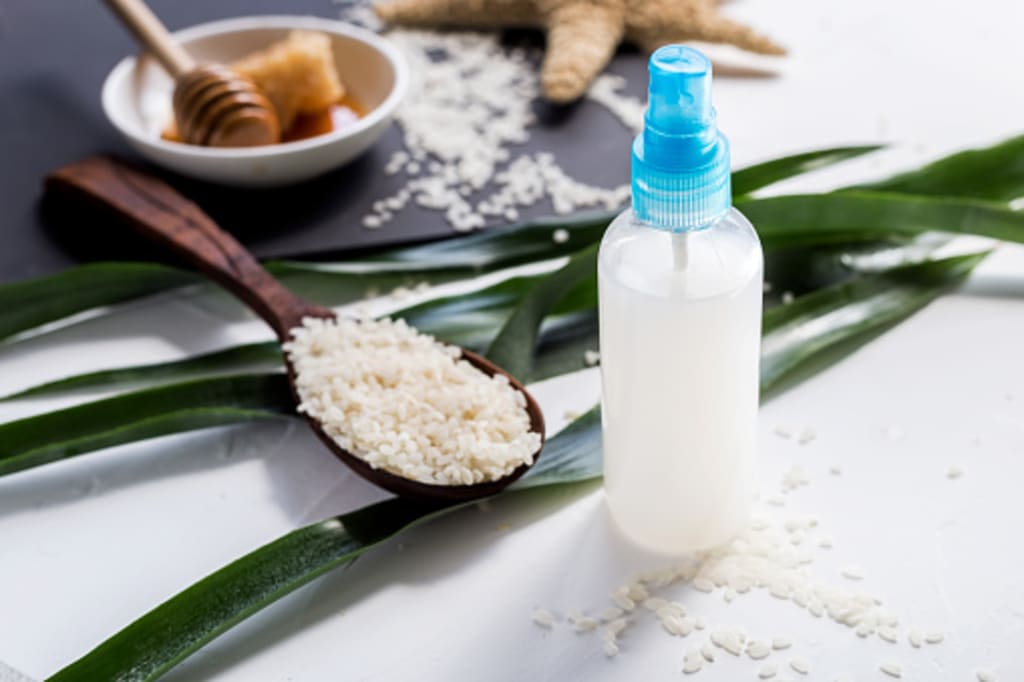Health benefits of rice water
Get to know every benefit that you can acquire from rice water.

Rice water, the starchy water that remains after rice is cooked or soaked, has been used for centuries in various cultures as a natural beauty and health treatment. Here are some potential benefits associated with rice water:
1. Skin care: Rice water is believed to have skin benefits. It contains vitamins, minerals, and amino acids that can help moisturize and nourish the skin. It may have a soothing effect on the skin, potentially reducing inflammation and redness. Some people use rice water as a facial cleanser or toner to promote a clear complexion and improve the overall appearance of their skin.
2. Hair care: Rice water is often used as a hair treatment to improve the health and appearance of the hair. It can be used as a rinse or hair mask to strengthen the hair, enhance its shine, and promote hair growth. The amino acids in rice water are thought to repair damaged hair and prevent breakage. Additionally, it may help reduce scalp irritation and dandruff.
3. Sunburn relief: Applying rice water topically to sunburned skin may provide relief due to its cooling and soothing properties. The starch in rice water can create a protective barrier on the skin, potentially reducing redness, inflammation, and discomfort caused by sunburn.
4. Digestive health: Drinking rice water can potentially aid digestion and soothe an upset stomach. It is a gentle, easily digestible liquid that can help alleviate symptoms of diarrhea or gastrointestinal discomfort. Some cultures use rice water as a home remedy for treating digestive issues.
5. Nutritional value: Rice water retains some of the nutrients from the rice, such as vitamins, minerals, and carbohydrates. While the concentration of nutrients may vary depending on the type of rice and the preparation method, consuming rice water can provide a small amount of nutrition.
1. Nourishes and moisturizes the skin.
2. Helps soothe sunburned skin.
3. Improves skin elasticity.
4. Reduces the appearance of fine lines and wrinkles.
5. Evens out skin tone.
6. Brightens the complexion.
7. Helps fade dark spots and hyperpigmentation.
8. Calms skin inflammation and redness.
9. Acts as a natural toner.
10. Minimizes the appearance of pores.
11. Helps control excess oil production.
12. Reduces acne and blemishes.
13. Soothes and relieves skin irritation.
14. Provides a cooling effect on the skin.
15. Improves blood circulation in the skin.
16. Helps heal eczema and dermatitis.
17. Promotes a youthful glow.
18. Softens rough and dry skin.
19. Enhances the absorption of skincare products.
20. Can be used as a makeup setting spray.
21. Strengthens the hair shaft.
22. Reduces hair breakage and split ends.
23. Improves hair elasticity.
24. Adds shine and luster to the hair.
25. Promotes hair growth.
26. Detangles hair and makes it more manageable.
27. Soothes an itchy scalp.
28. Helps control dandruff.
29. Balances the scalp's pH level.
30. Can be used as a hair rinse or conditioner.
31. Boosts hair volume.
32. Provides essential nutrients to the hair.
33. Enhances the natural hair color.
34. Reduces frizz and flyaways.
35. Strengthens the nails.
36. Helps prevent and treat fungal infections.
37. Acts as a natural deodorant.
38. Soothes and heals minor skin abrasions.
39. Relieves itchiness caused by insect bites.
40. Helps reduce redness from rashes.
41. Acts as a natural astringent.
42. Assists in reducing puffiness and dark circles around the eyes.
43. Helps alleviate symptoms of skin conditions like psoriasis and rosacea.
44. Can be used as a facial cleanser.
45. Provides a gentle exfoliation for the skin.
46. Helps tighten and firm the skin.
47. Aids in skin regeneration and repair.
48. Boosts collagen production.
49. Helps reduce the appearance of cellulite.
50. Provides a calming and relaxing effect when used in baths.
Rice water contains several nutrients, including:
1. Carbohydrates: Rice water is rich in carbohydrates, particularly complex carbohydrates like starch. These carbohydrates provide energy to the body.
2. Vitamins: Rice water contains various vitamins, including B vitamins such as thiamin (vitamin B1), riboflavin (vitamin B2), niacin (vitamin B3), and vitamin B6. These vitamins play important roles in energy production, metabolism, and overall cellular functioning.
3. Minerals: Rice water contains minerals such as potassium, magnesium, and phosphorus. Potassium helps regulate blood pressure and fluid balance, while magnesium is involved in muscle and nerve function. Phosphorus is essential for bone health and energy metabolism.
4. Antioxidants: Rice water contains antioxidants such as ferulic acid and phytic acid. These compounds have antioxidant properties and help protect the body against free radicals, which can cause cellular damage.
5. Amino acids: Rice water contains some amino acids, the building blocks of proteins. While the overall protein content in rice water is low, it does contain small amounts of amino acids that contribute to various physiological processes in the body.
It's worth noting that the nutrient content of rice water may vary depending on factors such as the type of rice used, the preparation method, and the length of time the rice is soaked or boiled
About the Creator
Shamreena
Spread love and be loved by love💌.
Enjoyed the story? Support the Creator.
Subscribe for free to receive all their stories in your feed. You could also pledge your support or give them a one-off tip, letting them know you appreciate their work.






Comments
There are no comments for this story
Be the first to respond and start the conversation.